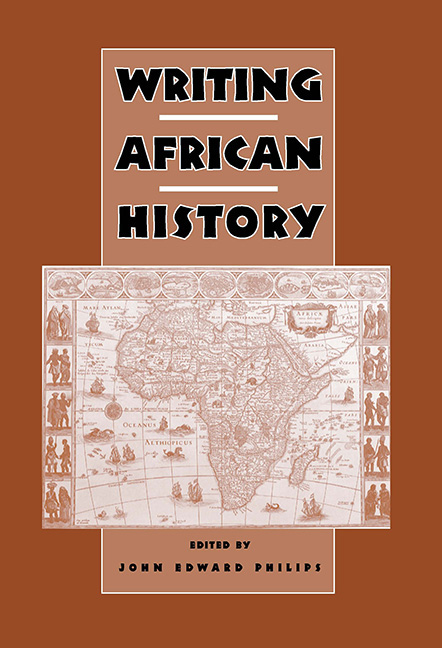Book contents
- Frontmatter
- Dedication
- Contents
- Acknowledgments
- Introduction
- Part I Background
- Part II Sources of Data
- 2 Archaeology and the Reconstruction of the African Past
- 3 Writing African History from Linguistic Evidence 86
- 4 Physical Anthropology and African History
- 5 The Importance of Botanical Data to Historical Research on Africa
- 6 Oral Tradition as a Means of Reconstructing the Past
- 7 Oral Sources and the Challenge of African History
- 8 Arabic Sources for African History
- 9 European Documents and African History
- 10 Mission and Colonial Documents
- Part III Perspectives on History
- Part IV Conclusion
- Contributors
- Index
- Miscellaneous Endmatter
4 - Physical Anthropology and African History
from Part II - Sources of Data
Published online by Cambridge University Press: 11 May 2017
- Frontmatter
- Dedication
- Contents
- Acknowledgments
- Introduction
- Part I Background
- Part II Sources of Data
- 2 Archaeology and the Reconstruction of the African Past
- 3 Writing African History from Linguistic Evidence 86
- 4 Physical Anthropology and African History
- 5 The Importance of Botanical Data to Historical Research on Africa
- 6 Oral Tradition as a Means of Reconstructing the Past
- 7 Oral Sources and the Challenge of African History
- 8 Arabic Sources for African History
- 9 European Documents and African History
- 10 Mission and Colonial Documents
- Part III Perspectives on History
- Part IV Conclusion
- Contributors
- Index
- Miscellaneous Endmatter
Summary
Physical anthropology, sometimes called biological anthropology or human biology, looks at synchronic and diachronic biological aspects of the human species. It includes palaeoanthropology, which examines aspects of Homo sapiens’ macroevolution. Its topics are as diverse as the energetics of agricultural labor in the tropics, and disease patterns in the skeletons of Late Stone Age populations.
Comparison, whether explicit or implicit, is usually the goal. Whether looking at physiological adaptations of high altitude peoples or the genetics of diseases in migrant groups, researchers try to contrast study populations with others, either real or theoretical.
In its earlier period, physical anthropology was primarily concerned with describing and classifying humankind, and with its evolution. This interest in classification, usually by “race,” has left its mark on the historical studies of all of the continents. Africa is no exception.
All Africanist scholars are aware of the Hamitic “hypothesis,” a biocultural construct that purported to explain various aspects of African biological, linguistic and cultural reality. Scholars are also aware that the African continent's peoples have been divided into “races,” units regarded as fundamental or even foundational, and that previous discussions of African historiography have frequently used “race” as part of an explanatory model, or as a necessary part of any description of historical actors. The issue of race cannot be avoided in any exploration of biological anthropology and African history, sad as this may be. The subject of “race” will be treated at greater length, as it is very important.
What can human biology offer to the “reconstruction” of African history? The question is complicated because it includes the word “history,” and serving all of “history's” many areas of study is difficult. To look at African history and biological anthropology as a unit brings to mind a variety of activities.
- Type
- Chapter
- Information
- Writing African History , pp. 112 - 151Publisher: Boydell & BrewerPrint publication year: 2005



